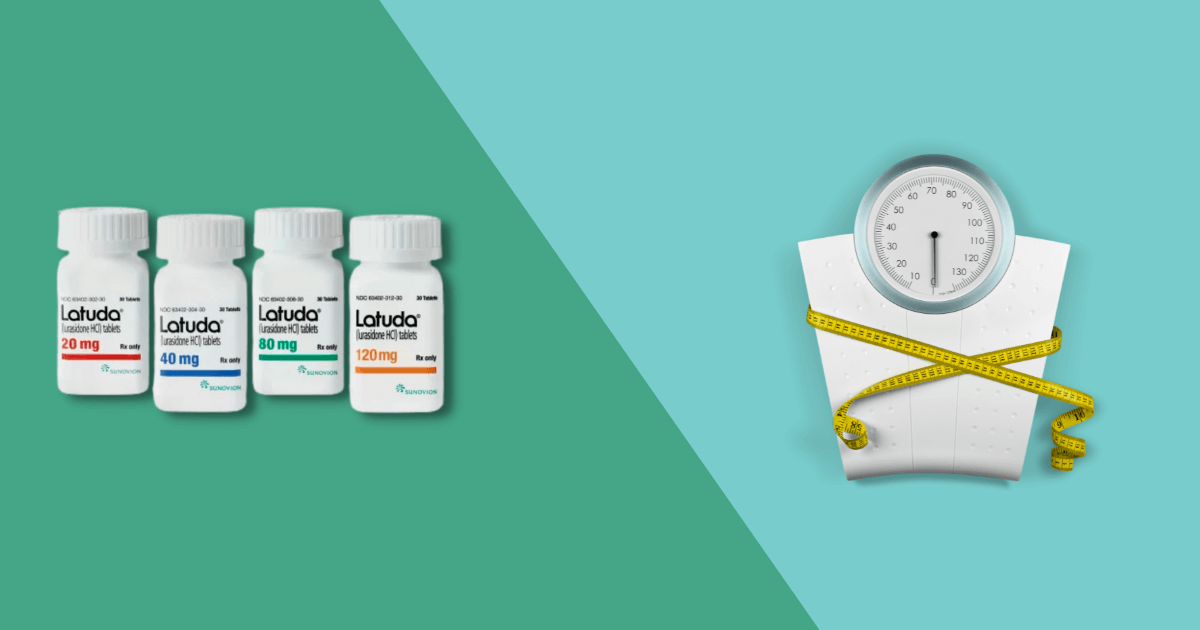Does Latuda cause weight gain?
Key highlights
- People with schizophrenia, schizoaffective disorder, and bipolar disorder are at an increased risk of obesity when compared to the general population.
- Treatment of schizophrenia and bipolar disorder with Latuda is generally associated with a lower risk of weight gain than other antipsychotics.
- Short-term use of Latuda is known to have a minimal effect on body weight along with other antipsychotics such as Abilify (aripiprazole) and Geodon (ziprasidone).
Table of contents
- What is Latuda (lurasidone)?
- What should you tell your doctor before starting Latuda?
- What are the most common side effects of Latuda?
- Does Latuda cause weight gain?
- Does Latuda affect your metabolism?
- Does Latuda or Abilify cause more weight gain?
- Can you lose weight while on Latuda?
- Will you lose weight after stopping Latuda?
- What medications does Latuda interact with?
- How long does it take Latuda to work?
Mental illnesses such as schizophrenia and bipolar disorder are associated with weight gain. Several factors can contribute to this, including lack of physical activity, unhealthy diet, genetics, and antipsychotic drugs.
Excessive weight gain and obesity can lead to heart disease, type 2 diabetes, and reduced quality of life. Most antipsychotic medications cause weight gain. The antipsychotics that have the highest risk of weight gain are Zyprexa (olanzapine) and Clozaril (clozapine).
It also appears that children and adolescents are at a higher risk of antipsychotic-induced weight gain. Latuda is generally considered to be weight-neutral. It may actually cause weight loss when taken long-term.
Read on to find out about how Latuda works and if it can cause you to gain weight while taking it.
What is Latuda (lurasidone)?
Latuda is a prescription medication that is manufactured by Sunovion Pharmaceuticals Inc. It is FDA-approved to treat mental health disorders such as:
- Schizophrenia
- Depressive episodes associated with bipolar I disorder (bipolar depression) as monotherapy
- Depressive episodes associated with bipolar I disorder (bipolar depression) in adults when combined with lithium or valproate
Latuda isn’t approved to treat major depressive disorder with mixed features (agitated depression), but it is sometimes used off-label for this purpose.
The active ingredient of Latuda is lurasidone. It is classified as an atypical antipsychotic. Some other examples of atypical antipsychotics include Abilify (aripiprazole), Geodon (ziprasidone), Seroquel (quetiapine), Saphris (asenapine), and Risperdal (risperidone). It is not known exactly how atypical antipsychotics such as Latuda work. It is thought that Latuda reduces the positive and negative symptoms of schizophrenia because of its antagonist activity at dopamine-D2 receptors and serotonin 5-HT2A receptors. It may also be partly due to its partial agonist activity at serotonin 5-HT1A receptors.
Latuda is available as an oral tablet in strengths of 20mg, 40mg, 60mg, 80mg, and 120mg. It is typically taken once a day with food (at least 350 calories). Taking Latuda with food significantly increases the absorption of this medication. Your doctor will determine your dose of Latuda. It may need to be adjusted if you have liver or kidney impairment or if you are taking certain medications that can affect Latuda’s absorption and metabolism.
RELATED: What is Latuda?
What should you tell your doctor before starting Latuda?
Before starting this medication, make sure your doctor is aware of your medical conditions, including:
- Heart disease or stroke
- High or low blood pressure
- Personal or family history of diabetes, metabolic syndrome, or high blood sugar
- History of high cholesterol or triglycerides
- High prolactin levels
- Low white blood cell count
- Seizure disorder
- Kidney or liver disease
- Are pregnant, plan on becoming pregnant because it may cause extrapyramidal and/or withdrawal symptoms to your baby if given during the third trimester
- Are breastfeeding because it is not known if Latuda is found in breast milk
What are the most common side effects of Latuda?
The most common adverse effects of Latuda seen in clinical trials when compared to placebo include:
- Drowsiness
- Akathisia (feeling restless or having the urge to move)
- Tardive dyskinesia (a movement disorder)
- Parkinsonism
- Nausea
- Vomiting
- Dry mouth
- Increase in body weight (pediatric patients 10-17 years of age)
- Insomnia
- Agitation and anxiety
- Dizziness
- Increased blood pressure or heart rate
- Increased blood glucose levels
- Changes in lipids and triglycerides
- Increased prolactin levels
Latuda can sometimes cause serious side effects such as:
- Serious hypersensitivity reactions
- Increased risk of death in elderly patients with dementia-related psychosis
- Increased risk of suicidal thoughts or behaviors (notify your doctor of any new or worsening depression or suicidal thoughts and behaviors)
- Neuroleptic malignant syndrome, especially if taken with antidepressants
- Low white blood cell count
Speak with your healthcare provider about the possible drug interactions with any other prescription drugs, over-the-counter products, vitamins, and supplements you are taking. These are not all of the possible side effects of Latuda. You should always seek medical advice for drug information or any questions about your medical condition or treatment. You can report side effects to FDA at 1-800-FDA-1088 or www.fda.gov/medwatch.
RELATED: Latuda side effects and how to avoid them
Does Latuda cause weight gain?
People with schizophrenia, schizoaffective disorder, and bipolar disorder are at an increased risk of obesity when compared to the general population. Treatment of schizophrenia and bipolar disorder with Latuda is generally associated with a lower risk of weight gain than other antipsychotics. Short-term use of Latuda is known to have a minimal effect on body weight along with other antipsychotics such as Abilify (aripiprazole) and Geodon (ziprasidone).
A retrospective analysis of electronic health records looked at the long-term effect of Latuda on body weight. It showed that patients taking Latuda lost an average of 1.7 lbs (0.77 kg) after 12 months of treatment. The study also showed that patients who switched to Latuda from other antipsychotics that were at higher risk for weight gain lost an average of 3.7 lbs (1.68 kg).
So while short-term studies found that people taking Latuda may gain a small amount of weight, those who take it for at least a year typically see a small amount of weight loss.
Does Latuda affect your metabolism?
Like most other antipsychotic drugs, Latuda may cause metabolic changes and weight gain, especially in adolescents or if used short-term. It is typically less likely to cause weight gain than other antipsychotic medications. Latuda is also associated with minimal metabolic and weight change when used for at least a year.
Does Latuda or Abilify cause more weight gain?
A common side effect of most antipsychotics is weight gain. Atypical antipsychotics such as Latuda and Abilify are considered weight-neutral when compared to other antipsychotics. A 2021 retrospective study of over 15,000 adults being treated for schizophrenia looked at the effect of Latuda, Abilify, and other antipsychotics on body weight. It showed that Latuda was associated with the smallest proportion of patients with clinically relevant weight gain and the greatest proportion with clinically relevant weight loss.
Can you lose weight while on Latuda?
When used for at least 12 months, Latuda has been associated with a small amount of weight loss in patients with schizophrenia or bipolar disorder. Patients who switched to Latuda from a second-generation antipsychotic with medium to high risk for weight gain saw a greater amount of weight loss.
Will you lose weight after stopping Latuda?
If you have experienced weight gain with antipsychotics such as Latuda, you may have a significant but small reduction in weight after the discontinuation of treatment.
What medications does Latuda interact with?
When taken with other medications, Latuda can change how they work or increase the frequency and severity of side effects. You should ask your doctor if any of the prescription drugs, over-the-counter medications, vitamins, and herbal supplements you take may interact with this medication, such as:
- Moderate CYP3A4 inhibitors such as diltiazem, atazanavir, erythromycin, fluconazole, and verapamil
- Strong CYP3A4 inhibitors such as ketoconazole, clarithromycin, ritonavir, and voriconazole
- Moderate CYP3A4 inducers such as efavirenz, etravirine, modafinil, and nafcillin
- Strong CYP3A4 inducers such as rifampin, avasimibe, St. John’s wort, phenytoin, carbamazepine
How long does it take Latuda to work?
In the treatment of schizophrenia, it can take several weeks before you start to notice a significant improvement in symptoms. In the first 1 to 2 weeks, you should start to see improvements in symptoms such as hallucinations, disorganized thinking, delusions, motivation, and desire to be around other people. It can take 2 to 3 months before you see the full benefits of Latuda therapy.
Medically reviewed
A medical professional has reviewed this article.


Jamie Winn, PharmD
Jamie Winn, PharmD
Dr. Jamie Winn received his Doctor of Pharmacy in 2002 from the University of South Carolina College of Pharmacy, Columbia, SC. Jamie is a medical reviewer for NiceRx.



